|
|
Scheduling Preferences
Your scheduling preferences allow you to modify appointment booking rules, controlling exactly when a student can book appointments, how many appointments they can book, and much more. These preferences will apply to all centers within the profile.
Time Restrictions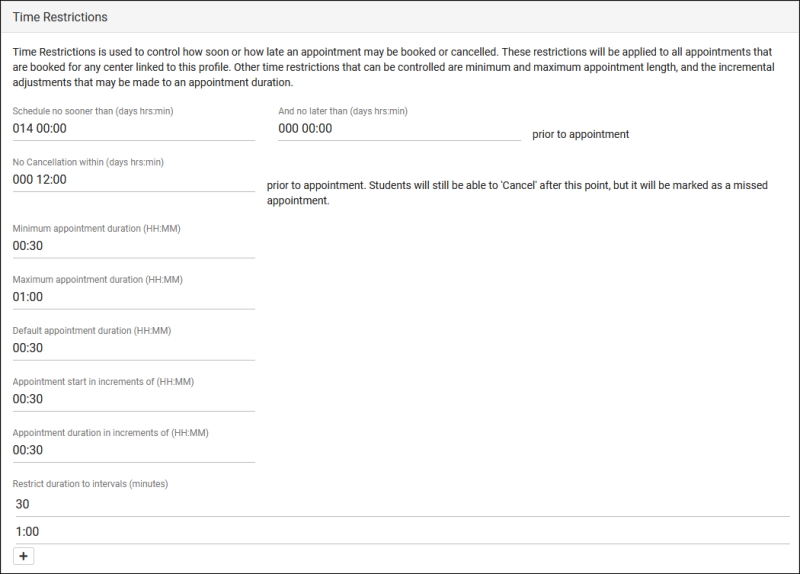
- Schedule no sooner than...And no later than
- This preference controls how early or late a student can book an appointment. The example below visualizes how this preference works, but the time range would typically be larger for a production system (e.g., no later than 12 hours, no sooner than 14 days).
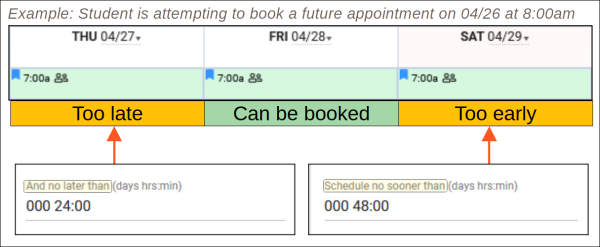
- Determines how late the student can cancel an appointment. If a student attempts to cancel within this time limit, they will be informed that the appointment will be counted as a missed appointment instead. Internally, the status will be recorded as "Cancel - Missed" (by default).
- Minimum and Maximum Appointment Duration
- This preference controls the minimum/maximum possible appointment time. If you exclusively offer 30 or 60 minute availabilities, this should be set to match. If an availability is created with time slots outside of the limit specified here, it will not appear in search results to students.
- Default appointment duration
- The default duration of an appointment. Typically used in an open-schedule environment, where consultants are available for many hours at a time, this will be the default duration when a student goes to book an appointment.
- Appointment start in increments of
- Increments of time that booked appointments can start at. For example, if this preference is set to 15 minutes, appointments could be booked at 9:15, 9:30, 9:45, and so on. This is not commonly used outside of open-schedule environments.
- Appointment duration in increments of
- Increments of time that an appointment can be booked for. For example, if this is set to 10 minutes, appointments can be booked for 20 minutes, 30 minutes, 40, and so on. This is not commonly used outside of open-schedule environments.
- Restrict duration to intervals
- The durations specified here will be used by default in your availabilities. Availabilities can be created with custom multi-slot times which can override this preference.

File:1919208.png
- Prevent students from booking consecutive appointments same student (any consultant)
- This prevents students from booking consecutive appointments in TracCloud. For example, a student could book a 10am to 11am appointment, but couldn't book an 11am to 12pm. Consecutive also means with same consultant can be used to block consecutive bookings with the same consultant specifically, which would allow a student to book a 10am to 11am with Dave and an 11am to 12pm with Jane. The default consecutive limit is 2 (no back-to-back appointments), but this can be modified if needed. For example, a limit of "3" would allow a student to book a 1pm to 2pm, and 2pm to 3pm, but not a 3pm to 4pm. Warn staff when they attempt to book consecutive appointments can also be enabled so that staff members are shown a warning when booking consecutive appointments on behalf of students.
- Allow entry into online appointment session
- These preferences control how soon/late a student can join a remote tutoring session by restricting when the Join button is available. If you’d like the student to be able to join 5 minutes prior to the start time through to the end, you would need to set “No sooner than” to 00:05 and set “No later than” to a value such as “1:00” (assuming you’re holding 1-hour appointments). No later than before end of appt counts back from the end time of the appointment rather than the start, and is an alternate option to No later than after start of appt.
- This applies to Batch Visit QR Codes and Ad-hoc Drop-in QR codes. If this is left blank, these codes can be used up to the end time of the visit. By setting this to a higher value, you can allow students to retroactively create visits for themselves after the visit has already taken place (e.g., in a recording). This preference counts from the start time of the session.
- QR Codes active no sooner than
- Similar to above, but in regards to how early a QR code can be used instead. By default (blank), QR codes can be used once they're created even if that visit would be days in the future.
- Block student from booking appointments between # and #
- This preference allows you to prevent students from booking appointments during a specific time of day. This is more commonly used if Schedule no later than is set to a low value, such as a few hours, allowing students to book close to the start time of the appointment. For example, if you want to prevent a student from booking a morning appointment in the middle of the night so that your tutors have more notice for their upcoming schedule, this is the preference you'll want to change. Default is blank, which does not apply any restrictions based on time of day.
Special Fields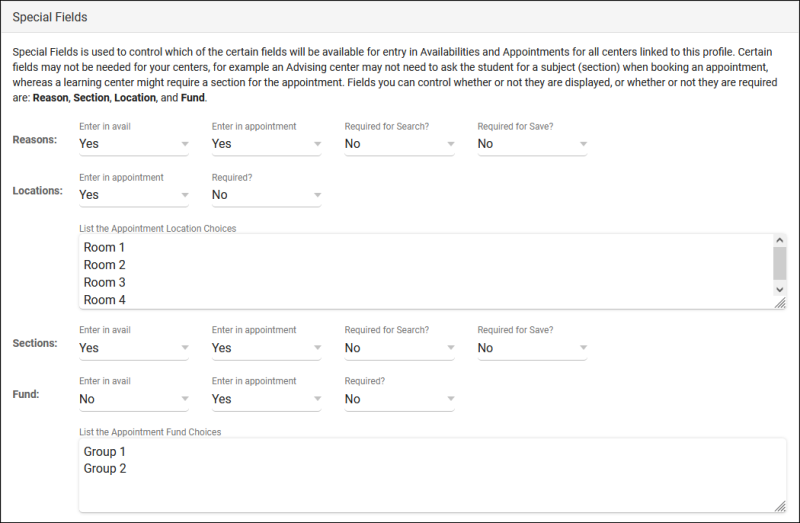
Each group of settings—Reasons, Locations, Sections, Fund—can be precisely adjusted to control where they show up and whether or not they’re required.
Enter in avail determines whether or not the field shows up within the availability entry window.
Enter in appointment determines whether or not the field shows up within the appointment entry window.
Required for Search means that in order for appointments in this profile to appear in search results, this field must not be empty.
Required for Save marks the field as required, so it must be filled out prior to booking the appointment. This applies more-so to Staff, as the above option already requires a student to have this field selected before they have the chance to book.
- Appointment Location Choices
- Allows to you to customize the locations available to choose from on Availability and Appointment entry. If used, this would typically be a more specific location than what your centers already describe. E.g., "Room 42 (location) in Peer Tutoring (center)."
- Allows you to customize the funds available to choose from on Availability and Appointment entry. More information on funds and payroll tracking in general can be found here.
Other Schedule OptionsFile:4448795.png
- Allow students to cancel appointments
- Provides students the option to cancel appointments (as long as they’re outside the time range specified in the first menu.)
- Display consultant alias on availability search
- This will display the consultant’s alias (specified in their staff profile) rather than their full name when students are searching for availabilities. An alias can also be automatically generated based on your System Preferences if preferred (e.g., First Name Last Initial).
- Display consultant email/phone on appointment entry
- Displays the specified consultant fields within appointment display, the following twig tags will or won't contain data based on these preferences.
{{Consultant.PhoneToStudent}}
{{Consultant.EmailToStudent}}
- Allow group online/in-person per time slot determined by first person that day and time
- If this is enabled, the first student booking an optional online/in-person multi-person availability decides if the session will be online or in-person for other students going forward. If this is disabled, each student booking the same time slot can choose online/in-person independently of each other.
- Allow student to upload documents to the appointment
- Controls whether or not students can upload documents to the appointment record.
- Allow staff to upload documents to the appointment
- Controls whether or not staff can upload documents to the appointment record.
- Block students from booking recurring appointments
- Prevents students from booking recurring appointments for themselves. Staff can still book recurring availabilities on behalf of students if needed.
- Allow availabilities to be asynchronous
- Enables asynchronous availability/appointment functionality. More information.
- Default value for availability max students
- Determines the default "Max Students" value when creating availabilities. This value can still be overridden when managing your schedule. 0 = drop-in, 1 = one-on-one, 2+ = group.
Appointment Status and Management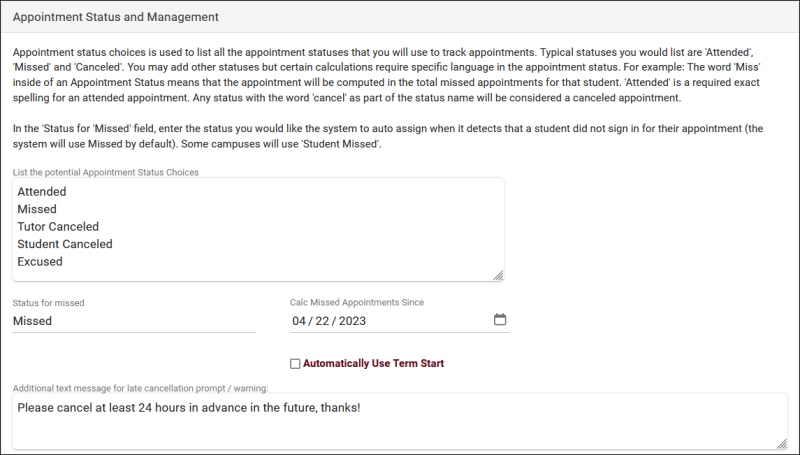
- Appointment Status Choices
- These are the statuses that appointments can be set to. Typically, this would be set to something similar to the above example, with an Attended, Missed, and Canceled status, however, you can modify the choices if needed. Statuses containing the phrase “Cancel” will always cancel the appointment, making it available for other users to book (provided they’re still within the “schedule no later than” time limit.)
- This is the status that TracCloud views as “Missed.” This should typically match the status set in your Missed Appointment Emails "Change missed appointment to Status:" preference.
- Calc Missed Appointments Since
- A student’s total number of missed appointments can be utilized in emails via the Twig tag below. This date determines how far back TracCloud searches for missed appointments. If this preference is blank, the global System Preferences date is used instead. Automatically Use Term Start can be used if you'd like to use the start date of your semester instead.
{{CalcMissedAppointments(Student.Sequence, Center.ProfileID)}}
- Additional text message for late cancellation prompt / warning
- This is an optional additional message that displays to students when they are cancelling an appointment outside of your time restriction. This appears in addition to the standard "This will be marked as missed" notice.
Max Appointment Rules and Blocks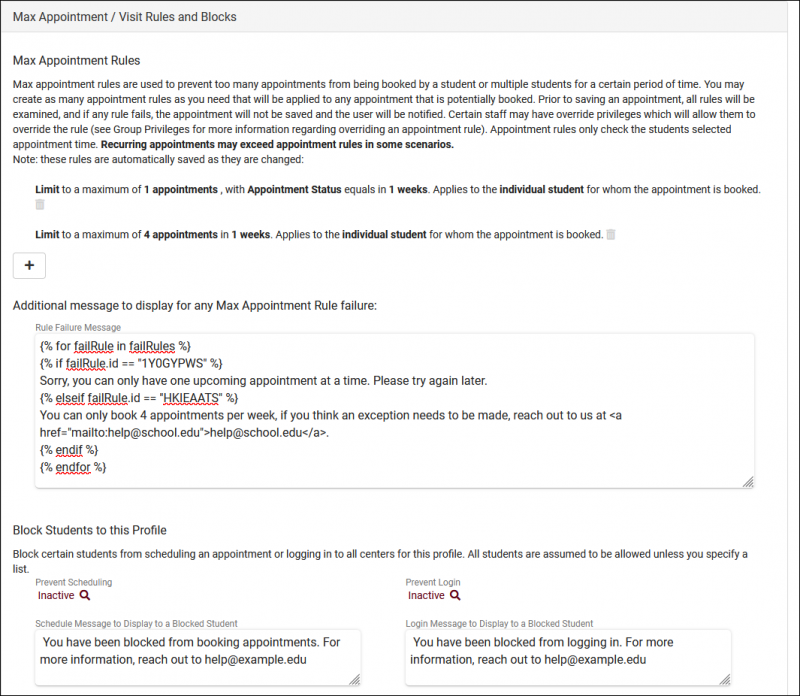
These preferences allow you to restrict students from booking excessive appointments, or prevent booking/logins altogether. “Max Appointment Rules” allow you to create restrictions that will dynamically block students from booking appointments if their appointment threshold his met, while “Block Students to this Profile” allows you to block access to logging in for visits or booking appointments based whether or not the student is on a specific list.
Max Appointment Rules
File:2722693.png
- Allow a maximum of X [hours/appointments] with:
- Choose how many appointments/total hours a student can book within the restrictions assigned below.
- Unique identifier for this rule, used for twig logic in failure message.
- Same: [Consultant / Reason / Center / Subject / Section / Location]
- This allows you to narrow down the restriction to specific fields. Maybe you don’t want a student booking excessively with a specific consultant, or booking too many appointments for a specific reason, this is where you would apply these rules.
- These clauses allow you to be more specific in where this rule applies. For example, you could add a search clause for Appointment Status and set it to "*Missed*" to apply max appointment rules to missed appointments, where a student wouldn't be able to book additional appointments once the limit is reached. You can also select specific Reasons, Centers, or Subjects where the rule should apply, to not affect unrelated appointments.
- in X [Days / Weeks / Months / Terms / Years]
- The time period for this rule. For example, you may want to restrict students from booking more than 3 appointments per week, or 10 appointments per month. This preference is where you’ll make that decision.
- If “X week” is used, you can choose the start day of the week to count from. If “X month” is used, this will be the first to last day of the month. If you would prefer any 7 or 30-day window, you will need to use something like “7 Days” rather than “1 Week”.
- This rule is active for appointment dates in the time period
- The date range that this rule is effective for. Maybe your current semester, or a monthly period.
- All students individually applies to only the student booking the appointment. John Doe (a student) can’t book more than 3 appointments with the same consultant per week.
- Students as a collective applies to every student. Jane Smith (a tutor) can’t be booked more than 3 appointments per day (by students).
- Allows you to only apply this rule to a certain |list of students (or students not on a specific list).
- Which appointment types should this apply do? E.g., only in-person 1-on-1 appointments. If left blank, this rule is applied to all appointment types.
- Students that fail this rule may be optionally added to a list
- This option requires that Same: and In X time period are both disabled. When the student attempts to book an appointment and is blocked by this rule, they will be added to the student list that you select.
- This is an optional custom message that can appear to students if they reach the limit of this rule.
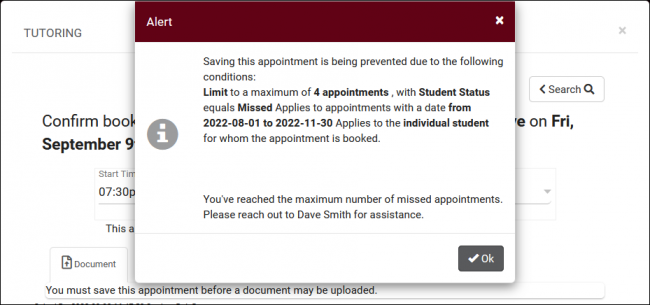
- Twig can also be used in this field to display student or consultant information. You can also modify the contents of the message based on which rule was broken. For example:
{% for failRule in failRules %}
{% if failRule.id == "1Y0GYPWS" %}
Sorry, you can only have one upcoming appointment at a time. Please try again later.
{% elseif failRule.id == "HKIEAATS" %}
You can only book 4 appointments per week.
If you think an exception needs to be made, reach out to us at help@school.edu.
{% endif %}
{% endfor %}
In addition to standard maximum appointment rules, you can also utilize these rules to set maximum tutoring/advising hours for your consultants.
In the consultant profile, set 'Max Hours' to your desired limit, e.g., "10".
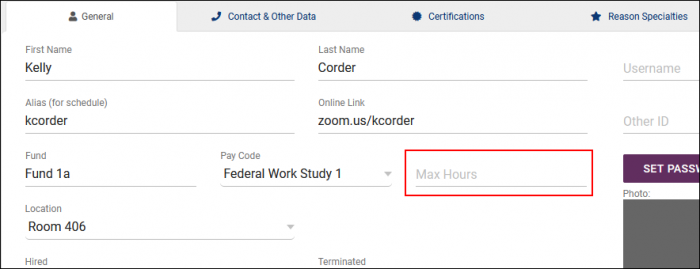
In your Maximum Appointment Rules, use the phrase "MaxHours" in the "Allow a maximum of [____]" field. When an appointment is booked, TracCloud will check the relevant consultant's maximum hours for use with this rule. If the newly scheduled appointment would be over the maximum number of hours set, it will be blocked.
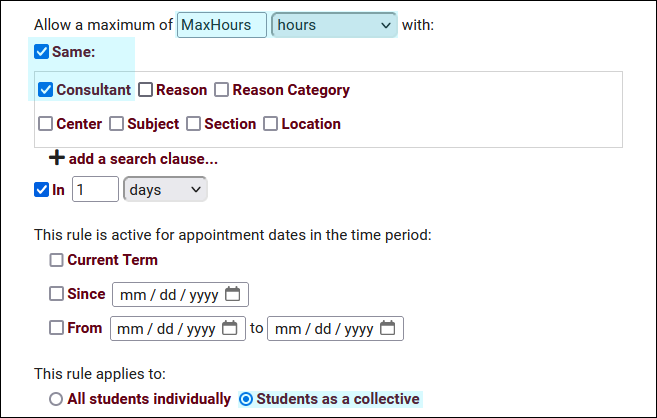
Block Students to this Profile
- Prevent Scheduling is where you will select a list of students that you want to prevent from booking appointments.
- Message to Display to a Blocked Student is the message displayed when a student on that list tries to book an appointment.
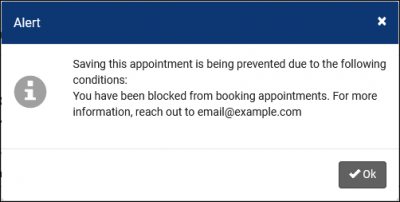
- Prevent Login prevents the student from being logged in on the Log Listing or a Kiosk.
- Message to Display to a Blocked Student is the message displayed when the student tries to login on a Kiosk or a staff member tries to log them in on the Log Listing.
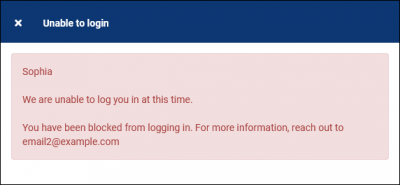
Appointment DisplayAppointment Display has its own wiki article which can be found here.
Search Availability BadgesSearch Availability badges can be used to add information and indicators to availability slots. Each badge can appear in specific contexts, based on center, availability section/reason, location, skills/accommodations, etc.
File:7942458.png
Click New Availability Badge to begin creating your new badge.
File:8036271.png
Any fields left blank will not be considered for where this badge appears, you can be as specific or non-specific as needed. You can also create as many badges as you'd like, more than 1 tag can appear for the same availability. Info Text appears when a user hovers their mouse over the badge in the search availability menu.
File:3529335.png
|










